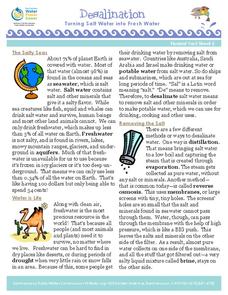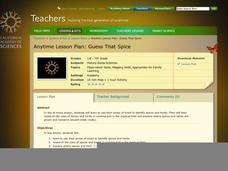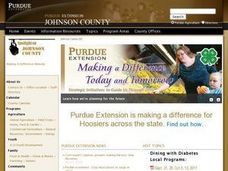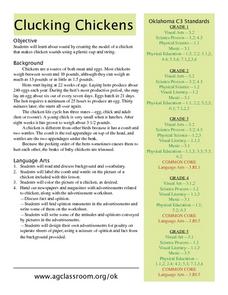K5 Learning
A Ship in a Storm
Give reading comprehension a boost with a two-page instructional activity featuring an informational text about ships at sea during stormy weather. After reading, scholars show what they know through four short-answer questions.
Pearson Longman
Leap Year
Have you ever been asked to explain a leap year/leap day? Use this response to reading worksheet to support your scholars in finding out what it is, and its importance to our calendar. This resource is made up of eight questions...
San Francisco Public Utilities Commission
Our Water: Many Users - Many Uses
California's water supply is not always stable. Learn about the ways that California weathers a drought with a reading activity about water usage and agriculture. Once kids finish the reading passage, they answer a series of...
San Francisco Public Utilities Commission
Desalination: Turning Salt Water into Fresh Water
How does San Francisco supply its citizens with enough water, even during a drought? Learn about reservoirs and why desalination could be a good solution with a reading passage about water conservation. After kids finish the...
San Francisco Public Utilities Commission
Recycled Water: A Smart Way to Reuse Water
Learn about wastewater and recycled water with a science reading activity. After learners finish a two-page passage about conserving the water supply, they answer six comprehension questions about what they have read.
San Francisco Public Utilities Commission
Hetch Hetchy: The Story of San Francisco's Water
How did San Francisco supply enough water for its residents over the last two centuries? Learn about droughts and water conservation in California, as well as specific historical events that led to the water system today. Kids read two...
San Francisco Public Utilities Commission
What is Groundwater? Our Underground Water Supply
Learn about the consequences of groundwater with a lesson about the different ways California handles water conservation and pollution. After reading a passage about the water table, learners apply what they have read to six...
San Francisco Public Utilities Commission
What is Drought? No Rain, No Water
How can climate change affect our water supply? Have kids read a passage about the water cycle and water conservation, which includes six questions that challenge them to use context clues.
K12 Reader
Evaluating Efficiency
There's more than one way to solve a math problem! Introduce your class to this concept with a reading passage. After reading, learners answer five related questions.
K12 Reader
The Great Depression
Try out this reading passage when teaching your class about the 1920s and 1930s. After reading the text, which provides an overview of some major events in these years, learners respond to five related questions.
K12 Reader
Hide and Seek
Why do certain animals look the way they do? It could be because they have developed camouflage. Kids can read up on camouflage and mimicry and then respond to five questions related to the content of the passage.
K12 Reader
Transcontinental Railroad
Who built the Transcontinental Railroad and why was it important? Your class can learn about the laying down of these tracks by reading a short passage. Pupils then respond to five questions related to the text.
Floyd County Schools
Who Is Hibernating?
Young scientists explore the wintertime behavior of common animals with this presentation on hibernation. Offering clear explanations about the who, what, where, when, and why regarding hibernation, this resource is perfect for primary...
Polk Bros Foundation
Read to Learn
Prepare for a research project or just use this worksheet on its own. Class members choose a topic, write a big question about it, and note down information they find about it. The final product is a longer written assignment in the...
Garden of Praise
George Washington Carver Test
This is a standard multiple-choice assessment on the life and ideas of George Washington Carver. It includes 20 questions on topics covering information about his birth and education, major career moves, teaching principles, ethics, etc.
Polk Bros Foundation
How to Summarize an Event in History or Today - or a Story
Ask your class to write a quick summary of a historical or current event. The worksheet offers a place to note down important details about the event, such as time, place, people, how it started, and how it ended. Pupils then take this...
Learning to Give
Humphrey The Lost Whale
The children's book Humphrey the Lost Whale tells an amazing tale of a community joining together for a common cause. Read this book with your class, making connections between the events in the story and personal experiences of young...
California Academy of Science
Guess That Spice
From medical treatments to cooking, people have been using herbs and spices for thousands of years. Perform a blind smell test of household herbs and spices to engage students in learning about ancient spice trading. Research the history...
Curated OER
Lesson 3: Proving Facts and Forming Opinions
Time for Kids: Butterflies is used to model the process of determining if a text is based on fact or opinion. Children are taught how to skim for key words, and use headings or chapter names to locate proof of whether or not what they...
Curated OER
Lesson 2 : First and Last Sentences (Passage)
Remember that old skimming technique, where you'd read the first and last sentence of a paragraph to glean the main idea? That tried and true college trick is taught to third graders as a way to gather information while they read. They...
Curated OER
Computer Basics For Kids Worksheet
The computer can be a wonderful tool with so many applications. Third graders read a four paragraph procedural text to learn about: central processing unit, memory, input, output. They answer four fill in the blank and multiple choice...
Curated OER
Make Mine Turkey
Young scholars compare foods available for the Pilgrims' Thanksgiving with contemporary Thanksgiving foods. After reading information about the first Thanksgiving, pupils create a menu and compute the cost of a turkey dinner, using...
Curated OER
Clucking Chickens
A comb, wattle, and beak are three characteristics that describe a chicken. Your class can explore the life of a chicken through reading, art, movement, and music. Using a plastic cup and string, they'll create a pretend chicken that...
Curated OER
Garden Grid
Basically, your class reads about different garden plants from an included handout and seed packets that you provide, and then uses a grid to plan out where to place the plants. They can practice counting with the seeds, grouping,...

























